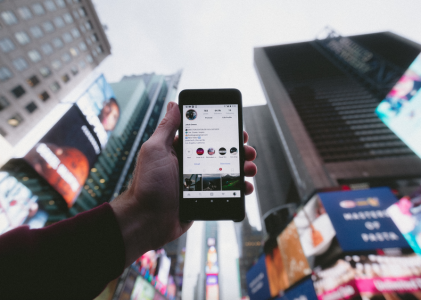Naoise’s Note: This is a guest post by Cathy Camper, a librarian for the Multnomah County Library, in Portland, OR. Cathy’s work has appeared in places such as Wired, Cricket, Cicada, Primavera, Women’s Review of Books, Lambda Book Reports, Utne Reader and Giant Robot. Full bio at the end of the post, or visit www.cathycamper.com – Thanks for the amazing contribution to the Acquisio Blog Cathy! (p.s. – I take full responsibility if wordpress has prevented me from displaying your article in as nicely presented formatting as it was provided to me, my apologies, but I can’t access the css to indent your paragraphs).
Forward and Backward; Musings on Librarianship and the Future of Search
By Cathy Camper
This article is written in response to Naoise Osborne’s engaging post “Nine Ways the Internet Could Change that Would Make Search as We Know it Obsolete” (August 26, 2009). As I read it, I had an eerie feeling that for me, a librarian, the future he described is my now. I posted a response, and Naoise invited me to write about search from a librarian’s viewpoint. So here I am.
Disclaimers first: like Naoise, I’m not a futurist, and unlike some of my colleagues, my job is to help people find what they want, not to work on the technical side of search, search engine optimization or search innovation.
Still, as a public librarian, search, as well as its more obsessive cousin, organization, is at the core of what I do. The future of finding information is the future of my job. When I first discovered online marketing articles addressing search, I was thrilled. But my eyes soon glazed over reading discussions of stickiness, click-through and bounce rates. My goal as a librarian is simply to ensure patrons find what they want. It doesn’t matter if they stare at one page all day or flip through hundreds if they leave satisfied. Libraries aren’t selling anything. Like the U.S. Post Office, public libraries often are left to do what no commercial enterprise would take on, for example, provide free Internet service, and instruction, to everyone.
In some ways, Google trumped librarians good when it fulfilled the publics’ need for a magic box that would find whatever the public typed in. Author, title, keyword, call numbers — the public never understood or cared what library metadata was anyways, and it turned out even accuracy mattered less than getting a slew of answers to requests in the blink of an eye.
On a larger scale, the Internet rearranged librarians’ approach to knowledge overnight. The one right answer no longer sat for years in a volume on the reference shelf; now there were many right answers, which would also always be changeable. The right answer might exist anywhere, not just on shelves or in catalog order, or provided by people of a particular profession, class, training or status. Actually this has always been true about knowledge. But now the speed and breadth of electronic information meant it could no longer be ignored, or protected by knowledge gatekeepers.
Librarians today are kind of like early mammals in dinosaur days, scurrying between the claws of commercial search giants like Google and Amazon, grabbing crumbs of information either straight from the behemoth’s clutches, or plucking information the bigger reptiles miss, to feed the needs of those that ask. We supplement search using books, databases, library resources and other means to fill in what the dinosaurs can’t provide.
One of the main contentions I have with futurist scenarios about information and search (for example, David Weinberger’s Everything is Miscellaneous) is that they are often built on an unstated platform of optimistic, forward movement, assuming a democratization of information access by making it free. Google replaces the lockdown of organizational systems with the infinite flex of individual search. Tagging does away with the Dewey Decimal system and the card catalog. Social networking disperses authority and expertise to everyone; Wikipedia cumulates it. MP3’s make CDs obsolete. Internet trumps library; the e-book trumps paper. Even the name and number of Web 2.0 implies a movement beyond, away from, whatever was the web point zero.
But the reality librarians deal with is that knowledge also moves backwards, authority and expertise still exist, and matter, and “free” may have costs.
Some examples. You’re restoring a 1930’s car. You need to see color samples to do a historically accurate restoration. Repair manuals, car books and extensive online searching turns up no color pictures. A library with magazine back issues may answer your needs; by searching backwards, you find a color ad for the car that shows not only the hues but also how they were applied.
Or say your research demands primary sources. Pretty much anything before 1982 may still be on paper, unless there’s been demand, (and funds) to digitize it. OK, so maybe it’s not on paper, it’s on a floppy disc. Or microform.
Which leads to another wrinkle. We have to not only search backward, we have to retain a method of doing it, technologically, if that information is to be of use. In the next twenty years, imagine the computers we inherit of baby boomers who’ve kicked the bucket. If and when the grandkids figure out the passwords, will they have any desire to look at Grandpa’s 10,000 unlabeled digital photos? If he’s uploaded and tagged some to Flickr, they might survive, but for the family archives, it might be the shoebox of labeled paper photos that gets passed on down the line. What about those unmarked floppy discs for a Commodore 64? Even if the family has the desire, can they find the machine to read them?
As to authority and expertise, it still exists right there in the double “ed logo of Google” branding. The hidden change is that it’s been corporatized. These search giants are commercial; their best right answer, in essence, is a product to buy. Google is free only in that it makes enough on advertising to stay solvent. Google works well if you want to buy something. It works less well if you’re researching expertise in knowledge, say in the forefront of cancer research, where a medical database or a cancer institution’s holdings may be more to the point.
Another problem with corporatized information is that it’s not always in the users interest, though it often looks to be. An example might be when your financial institution pushes you towards electronic banking by telling you “conserving paper conserves trees.” They’re also not telling you the cost of electronic banking, or that should you need a paper statement, the bank will now charge you for that. Similarly, YouTube, MySpace and Facebook strive to maintain an image of magnanimity, offering “free” products, while at the same time extracting payment from users via privacy invasion, and maintaining an ultimate authority over what gets shown and who gets space. These social networks aren’t public square forums where anyone can say their piece. Read through their user agreements to see who has ultimate say.
Speaking of users, patrons, customers, they also can direct search skills backwards as well as forwards. Public libraries have been hugely influenced this way by the recent recession. No longer can a ditch digger find a new job through newspaper want ads. Now, he has to look online, on Craig’s list. But to do so, a 50-year-old ditch digger has to learn to type. He has to know how to write a resume, and use software to do that. Then he has to learn to use the Internet, e-mail protocol, and letter writing skills. He has to have an e-mail address. And he has to have Internet access. If he can’t afford it, his only free access is one hour a day at the public library.
Libraries go backwards to bring these users forwards. True, it’s momentary, and in some rosy future, all people will be Internet savvy or will have died off. But what may not change is that the Internet will be freer for some than for others. One hour a day, shared access, will give you different results and opportunities than owning your own computer with 24-7 availability. The Internet may be the land of milk and honey, but the bottleneck to get there, for many, is long and narrow.
So this is the state of my job now, to move backwards and forwards, to find the best answer to match the individual needs of each patron. In a way, my job is to be a Web 2.0 search engine, to search what David Weinberger calls the “mess of information” out there, to fetch and present the best answers to each individual, in a way that best meets their needs.
So what of the future of search? Personalize online searching will wreak havoc with library assistance. At best, I could look over your shoulder, throwing out suggestions, or we’d each search, then contrast and compare.
Some futurists predict that search will disappear, and that in the near future, artificial intelligence will surpass human intelligence. While I don’t doubt this will happen, we rarely jump into the future all in one leap. Look around you at our 2009 neighborhoods — while some houses could be inhabited by the Jetsons, many more date to the 1950s or even Victorian times. A good model of the future needs to incorporate lots of old baggage.
A realistic model of information storage and retrieval needs to consider worst as well as best case scenarios. Not adding up the cost of electronic bank statements may save paper but not the environment. There are lots of dystopian futures out there that could seriously interrupt our Internet idylls. Global warming, the demise of petroleum stocks, epidemic – none of it bodes well for electronic access as we know it. All it takes is for the plug to get pulled — no more electricity — and we go from the Jetsons back to the Flintstones. Recent movements such as growing food locally, self-sustainability, and alternative energy and transportation sources are important for librarians to know about, on and off the Internet, into the future. And again, much of the information for these movements is found researching past knowledge, searching backwards, to go forwards.
Now let’s get dystopian dark, let’s look at the monopoly Google is amassing. No longer is the hoard gold or land holdings. It’s information. That includes information about you, which you might consider private. One of the reasons librarians are challenging Google is because it’s dangerous when information is privatized because its use no longer falls under public laws regarding privacy, accessibility or dispersal. But it’s also dangerous when one entity becomes king of the heap. If I were an evil hacker-terrorist-despot, why bother getting the bomb? Go for the fountain of knowledge instead; invade and conquer Google. There are lots of variants to this Google nightmare. What if Google simply disappeared, just wasn’t there tomorrow? What if Google becomes a monopoly of all recorded information? What if Google decided they were tired of being nice and free, now they were going to be tight, mean, and expensive?
Early in this article I used an analogy comparing librarians to early mammals. I did so not because I believe (though I hope) future librarians will grow big and dominate like the mammoths and smilodons of yore, but because things can change, best evidence in history all says they will, and that change can be unpredictable. We’ve been graced by a bubble of time, here in the U.S., free of war, strife and invasion. But civilization is fragile. Rosy futurist scenarios that forget to look at history are arguing the wrong points. The best chance of information survival is not publicity, authority, power, electronic storage or even paper recordings. Our oldest surviving stories were written on clay tablets and buried it in the desert, dependant as much on fluke as human planning for their survival.
I sometimes daydream a potential sci-fi novel, a futurist nightmare scenario, one based on human fallibility. Futurists describe an Internet with limitless choices, brimming with good information. But imagine as years go by, an Internet that accrues some good along with all the bad ads, the false information, the self-aggrandizing websites, the unsigned come-ons, plus information reiterated again and again with no accreditation or date stamp. For a window on what I’m talking about, try searching “acid reflux” on Google. You’ll get some good hits, and hours and hours of pseudo-science. Multiply that times twenty or fifty years. Let’s also imagine a future where we can’t look back. Libraries are unfunded; the doors locked, the books piled in dusty heaps. Microfiche, floppy discs, CDs abound, but machines to read them no longer exist. 16mm films sit cracked in their canisters. Bureaucrats cut funding for institutional and private databases, directing all pleas for education to the Internet. Why not, it’s free?
Let’s add to that a public that even now, at the height of information availability, is no less susceptible to rumor, is no more insistent on fact than in the past, and is just as likely to believe that because something’s in print, it must be true. The recent debates about healthcare in the U.S. points this out, all ideologies aside. Much of what is being argued and debated is not based on fact.
Add to that the big free library that Google Books promises to become. Only this library is only accessible using Google’s sloppy metadata, as Geoffrey Nunberg makes clear in his article “Google’s Book Search; A Disaster for Scholars.” Misdating, cataloging errors, classification errors abound. Nunberg finds a 46-70 percent error rate on misdating alone, but as he says, — “even if the proportion of misdatings is only 5 percent, the corpus is riddled with hundreds of thousands of erroneous publication dates.”
Voila! A dark ages in the Age of Information, where the litter of useless knowledge impedes search, where falsehoods become truths because they’ve lasted the longest, they’re the top of a hit list, or because a celebrity twittered it. More information will be collected, but equally will it be jettisoned, because of ignorance or expediency. History predicts what gets saved will be things that are most organized, most accessible, and most obviously valuable. And like medieval times, who can access, use, understand and protect information may narrow.
This is truly a worst case scenario. In reality, the future’s more hopeful. If like Nunberg suggests, Google books were to connect with the Library of Congress or OCLC’s metadata on books, we could create a library unrivaled in any other human civilization. Steps to self-monitor or organize information, for example changes in Wikipedia to promote accuracy, may tame the wild frontier we now search. These actions are the duties of future librarians. These organizers probably won’t hold library degrees, or be called librarians — they may not even be people, as artificial intelligence and Web 3.0 mature – but this wrangling of information is the forefront where innovation will occur.
Hopefully we’ll always exist in a place somewhere between information dystopia and utopia, a place that allows enough happy accidents, that there will always be a need for search. The buried doubloons. The lost and refound manuscript. The private collection. Though I’ve defined the future librarian mainly as an organizer, the passion is equally the hunt. And even more than the hunt is the importance of what we serendipitously find along the way. The Internet is great for this. But so is fossil hunting. Forward and backward. We need both.
Truly my greatest fear is a universe where everything is known, the end of search. A GPS connected to RFID tags, so there’s no possibility of hidden treasure, no wondering what happened to Atlantis, or what’s at the center of the Universe. It scares me that that may be the end goal of artificial intelligence, to cut us loose from the weight of the unknown, to free our time from pondering. But for what? So we can play electronic games, plotting, scheming, dreaming– pantomiming search?
the end
Cathy Camper is a librarian for Multnomah County Library, in Portland, OR, where she works in School Corps doing outreach to schools, grades K-12. She has edited recipes for Amy Sedaris’ book I Like You, and published a children’s science book Bugs Before Time; Prehistoric Insects and Their Relatives with Simon and Schuster (2002). Her work has appeared in places such as Wired, Cricket, Cicada, Primavera, Women’s Review of Books, Lambda Book Reports, Utne Reader and Giant Robot. She co-edits a small zine about candy called Sugar Needle. More at www.cathycamper.com
She thanks librarians Gregory Leazer at UCLA, and Wendy Hitchcock, at Lewis and Clark Law School, for their insights and suggestions on this topic.



